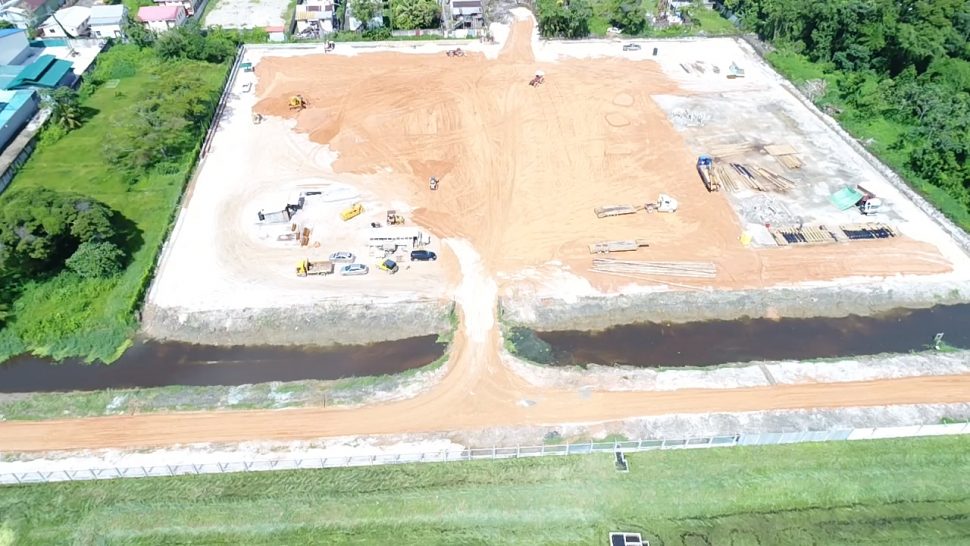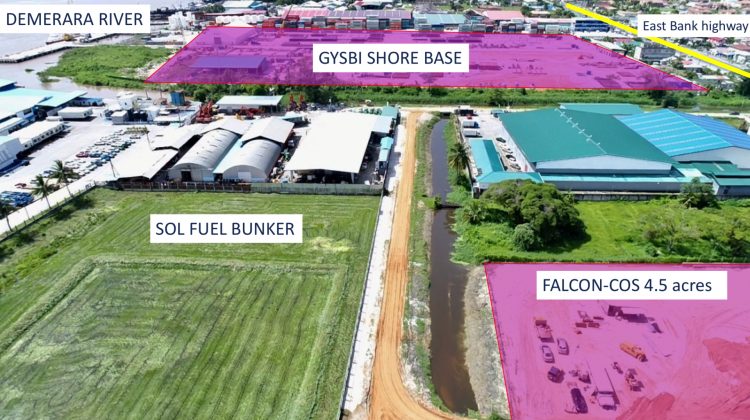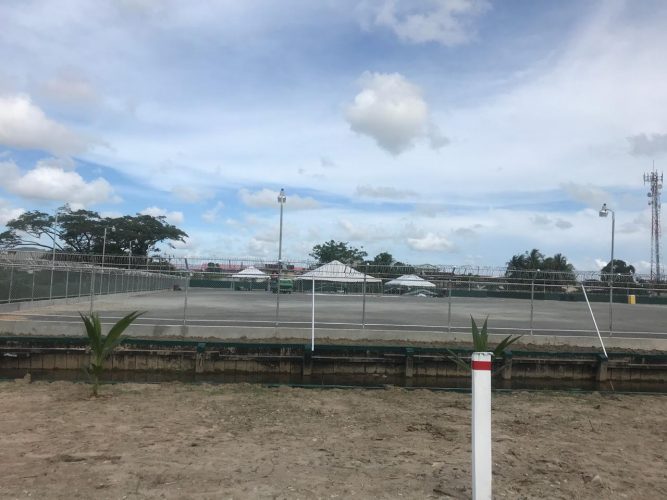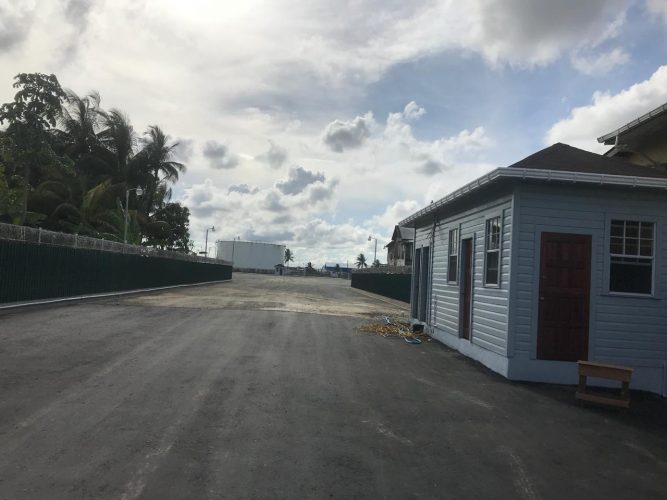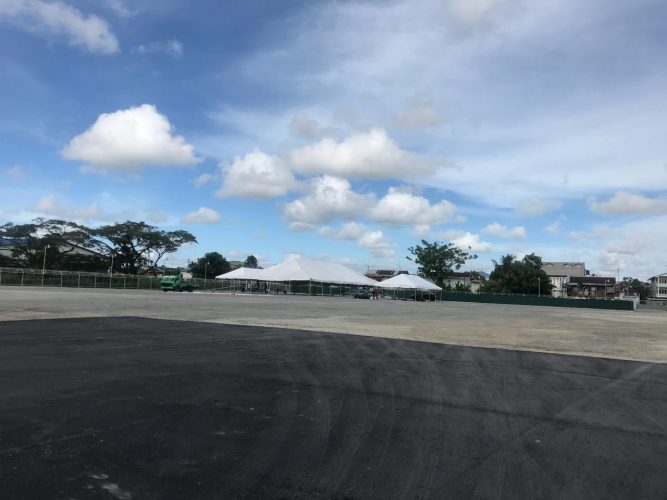Tapping into the emerging oil and gas sector, gold magnate Nazar ‘Shell’ Mohamed has made a big investment in a storage facility at Mc Doom on the East Bank of Demerara which is expected to serve ExxonMobil’s current offshore works.
Commissioned today, Mohamed told Stabroek News that he invested heavily to transform the marshy and abandoned area into the now developed, industrially-zoned `laydown’ yard it is today. Named Falcon Logistics Incorporated, Mohammed inked an agreement to have an ongoing lease with two companies over a five-year period.
It is expected that sixty jobs would be created with that figure divided equally between locals and foreigners. And with most of the work being done using machinery, as it would require “lots of heavy lifting that doesn’t require manual labour”, Mohamed underscored that the project was a capital and not labour-intensive one.
“The purchase and development of the land was done by Mohammed’s Enterprise and we would be leasing this facility to Falcon Logistics and NNP Capital Partners Limited. Falcon is a local company while NNP are foreigners who are here as part of the shore base business. They would be providing services for Exxon,” he explained.
“The facility is called a laydown yard and they would store things like pipes and machinery; things that cannot be damaged by the weather here. These would, as need be, be transferred to the shore base nearby and then off to the rig. So basically it is a service facilitator for the Houston shore base,” he added.
Minister of Business Dominic Gaskin and former Presidents Bharrat Jagdeo and Donald Ramotar along with members of the business community were among attendees at today’s commissioning.
Mohamed did not go into specifics of the cost of the 4.5-acre storage facility which is located approximately 500 meters south of the Houston shore base and which it will provide support services to, but told of the magnitude of development it required.
“It is a very costly project and huge project because we had to buy the land and the land had huge trees and was forested and swampy very similar to the next door [lands]. We had to prepare that land, some places needed filling in to three or four feet, then we had to put loam and crusher [stone]. It is a multimillion US (dollar) project,” Mohamed said.
From today, Falcon and NNP Capital Partners Ltd would begin using the facility for a five-year lease period, subject to purchasing if Mohamed decides he wants part ownership.
According to Falcon Logistics’ website, the company is a 100% Guyanese company. “We started our operations in 2013 with our primary focus on offering competitive Logistics and Support Services to the Oil and Gas Sector in Guyana. Our team players have over 35 years of logistics experience in serving the extractive resource sector in Guyana,” the company stated.
“Falcon Logistics Inc. seeks to provide quality and competitive Logistics and Support Services to the Oil and Gas Sector in Guyana. Falcon Logistics Inc. believes the corporate world can join with other stakeholders including Government and NGO’s to contribute to the welfare of the Community at large, including; disaffected and Disadvantaged, Education and Youth Development Health and Well-being,” it added.
Falcon also boasts of stellar local content policies it implements in its operations. “The principles of Falcon Logistics have adhered to a `Guyanese hire’ policy and local content in all aspects of their activities in Guyana for over 20 years. We believe the cost of training can be offset by the reduced transportation and accommodation costs for foreign workers. We partner with our Guyanese employees and require of them to put in training effort and dedication if they are not familiar with the tasks being offered,” the company notes.
Clear and predictable
And it is against the background of local content policy that Opposition Leader and former President Jagdeo, who gave a brief address at the commissioning today, called on government to give the nation a clear direction on its local content plans. According to Jagdeo, “government has no clear and predictable local content policy to guide” and as such locals here do not know what specific areas they can gear their studies or investment plans towards.
But Minister of Business Gaskin dismissed Jagdeo’s assertions saying that there are local content policy implementations and before persons take a stance they should familiarize themselves with what those policies are.
“The discussion on local content has been heating up and it’s not a bad thing that Guyanese are expressing themselves on this important subject. We may not all agree on how Guyana can best benefit from its petroleum resources but I am convinced that we all want what’s best for Guyana. Just like in cricket. Our hearts are in the same place. And what’s best for Guyana is for petroleum exploration, development and production costs to be spent in Guyana wherever possible and where this is not possible we must know why it is not possible and what feasible ways we can find to make it possible,” Gaskin said.
“We can never achieve 100% local content and we shouldn’t frustrate ourselves over this reality. We need to build capacity in areas where we lack skills and expertise needed by the petroleum sector. We need to improve safety standards and implement management systems so that we can work with companies that require these to be in place. We need to provide training in areas where we lack trained personnel in Guyana. Some of this is already happening. A lot more still needs to be done, and is being done. There are already local content provisions in the now famous contract, the production sharing agreement that lots of people like to talk about and write about but that very few have actually read,” he added.
Catching up
Gaskin said that those provisions already require the contractor to give preference to Guyanese employees and Guyanese goods and services; and to provide annual local content plans for approval and to report their achievements against those plans among other things.
He pointed to ExxonMobil’s Centre for Local Business Development which he said is doing a lot of work to build local capacity and to raise awareness of various aspects of the oil and gas sector so that Guyanese businesses can understand and meet the requirements of the industry.
“But the truth is that you cannot neglect something for decades and then suddenly catch up with the rest of the world in three years. We have a lot of catching up to do and unfortunately it can’t be done overnight,” he posited.
“The good news is that petroleum exploration and production are long-term activities and this industry will be with us for another thirty to forty years at least, so once we make the right choices and decisions and build our local capacity. We will be able to reap the benefits of our natural wealth. And so I encourage more Guyanese companies to follow the example of Mohamed’s and Falcon Logistics and prepare for the opportunities that oil and gas can bring to Guyana,” he added.
The Minister of Business told attendees that there are very real developments taking place in Guyana which will benefit its people. How much the populace actually benefits, Gaskin says, “will depend on how well we prepare ourselves”.
“Government, individuals, businesses, we all need to get ready if we want to maximize our participation in Guyana’s rapidly developing oil and gas industry. And this is why I am always happy to see Guyanese companies taking the initiative and positioning themselves to take advantage of the opportunities that lie ahead. So I must congratulate Mohamed’s and Falcon Logistics for marrying their strengths with a view to participating meaningfully in the oil and gas value chain. We must not fall into the trap of believing that there are no opportunities for Guyanese in this sector. It is self-defeating and can kill the hopes and dreams of the Guyanese people. Success in business requires an optimistic mindset and a positive outlook. There will always be opportunities for business but they will not fall into our lap. We have to go after them. We must be smart and pro-active and competitive. Perhaps most of all we must be determined,” he stressed.
He added, “The truth is that we have every reason to be optimistic. I’m very optimistic about Guyana’s future. I see a bright future for Guyanese. I have confidence in the Guyanese private sector. I know that Guyana will begin to produce oil in less than two years. A lot of oil. Guyana’s oil. I know that the operating costs to produce this oil are going to be significant. I know that these costs will involve hiring of people and the procurement of goods and services. And when the people hired are Guyanese and the goods and services procured are from Guyana then these are considered local content.”
